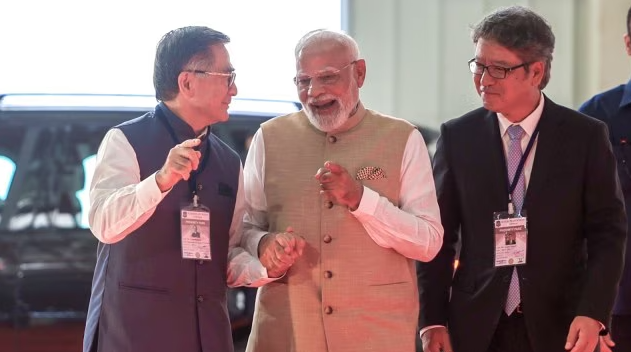As Prime Minister Narendra Modi embarks on a two-day visit to Japan from August 29–30 to attend the 15th India-Japan Annual Summit at the invitation of Japanese Prime Minister Shigeru Ishiba, the partnership between the two nations has entered a new phase of accelerated economic and strategic engagement.
Over the past two years, more than 170 Memorandums of Understanding (MoUs) have been signed, representing over $13 billion in committed investments across diverse sectors. From steel plants in Gujarat to biogas projects in rural India, from Assam’s gateway role to Tokyo’s advanced R&D hubs, and from semiconductor fabs to academic exchanges, India and Japan are building a comprehensive bridge of cooperation.
Guided by the vision of “Make in India, Make for the World”, this partnership is reshaping industrial, agricultural, and human capital landscapes—not only for the two nations but for the wider region and global economy.
Nippon Steel (AM/NS India) is scaling up operations in Gujarat with a ₹15 billion investment and setting up a ₹56 billion integrated steel plant in Andhra Pradesh.
Suzuki Motor has announced a ₹350 billion investment for a new plant in Gujarat and an additional ₹32 billion to expand production lines. Toyota Kirloskar is investing ₹33 billion to expand operations in Karnataka, alongside a ₹200 billion greenfield plant in Maharashtra.
Sumitomo Realty has invested $4.76 billion in real estate, while JFE Steel is committing ₹445 billion to strengthen electrical steel production. In aerospace, Astroscale achieved a milestone as the first Japanese commercial satellite launched using ISRO’s PSLV.
Japanese industry partnerships are bringing Indian small and medium enterprises (SMEs) into global supply chains. Tokyo Electron, Fujifilm, and Tata Electronics are building India’s semiconductor ecosystem, enabling Indian SMEs to supply high-value components.
Toyota and Suzuki’s expanding value chains are set to integrate hundreds of Indian Tier 2 and Tier 3 SMEs. Meanwhile, Fujitsu is recruiting 9,000 Indian engineers at its Global Capability Centre, strengthening India’s IT-linked SME ecosystem.
These initiatives are helping SMEs adopt global best practices, infuse technology, and access international markets, thereby boosting India’s export competitiveness.
Japan is also directly empowering India’s rural economy through green energy projects. Sojitz Corporation, in partnership with Indian Oil, is investing $395 million to establish 30 biogas plants with a combined output of 1.6 million tonnes annually. Farmers will supply agri-waste and crop residues, creating additional income streams while supporting India’s clean energy transition.
Suzuki Motor Corporation, in collaboration with the National Dairy Development Board and local dairy cooperatives, has launched a biogas initiative adopted by UNIDO under Japan’s METI-funded Industrial Cooperation Programme. Beginning in 2025, four biogas plants in Gujarat’s Banaskantha district—built with a ₹2.3 billion investment – will convert cattle waste into carbon-neutral biogas for CNG vehicles, which constitute nearly 20% of India’s passenger car market.
These projects will reduce emissions, strengthen energy security, generate rural employment, and raise farmer incomes, while embedding Japanese technology into scalable clean-energy infrastructure.
Nippon Steel’s projects are set to boost speciality steel exports to global automotive and energy markets. Toyota and Suzuki’s hybrid and electric vehicles manufactured in India will be exported to Africa, the Middle East, and Southeast Asia.
Human capital exchange is another fast-growing pillar of cooperation. Under the India-Japan Talent Bridge programme and METI initiatives, 50,000 Indians and Japanese are expected to participate in exchanges over five years through study abroad programmes, internships, and employment opportunities. Professors, students, and young professionals are engaging with Japanese companies and universities through structured networking and roundtables.



